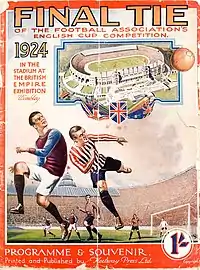| 1923–24 season | |
|---|---|
| Chairman | Frederick Rinder |
| Manager | George Ramsay |
| Stadium | Villa Park |
| First Division | 6th |
| FA Cup | Finalists |
| 12--7--6 | |

The 1923–24 English football season was Aston Villa's 32nd season in The Football League.
On 11 November 1923, Aston Villa centre-half Tommy Ball was shot dead by his neighbour, thus becoming the only Football League player to have been murdered.[1]
By December, consecutive victories over Nottingham Forest enhanced Cardiff's lead in the table. However, the form of rivals Aston Villa, Huddersfield Town and Everton meant that Cardiff were unable to extend their lead by more than two points.[2]
Villa's 1–3 victory over Huddersfield Town A.F.C. on 17 April 1924 was the biggest loss for the Yorkshire club that season.
Dicky York scored five goals in 43 games in 1923–24.[3] He also appeared at Wembley in the 1924 FA Cup Final.[3]
There were debuts for Alec Talbot (264),[4] Teddy Bowen (203),[5] Vic Milne (156), Billy Armfield (12), Albert Surtees (11), Percy Varco (10), Alex McClure (7), Joe Corbett (8), Archie Campbell (4), Bert Singleton (2), and Norman Mackay (2).[6]
Second City derby
Aston Villa's visit to Small Heath on 25 August 1923 produced the Highest home attendance that season for the local rivals. Villa lost the away fixture 3-0.[7] The 59,147 crowd watched a goaless draw at Villa Park.[8]
Aston Villa in the league at home
|
Birmingham in the league at home
|
Football League First Division
| Pos | Team | Pld | W | D | L | GF | GA | GAv | Pts |
|---|---|---|---|---|---|---|---|---|---|
| 4 | Bolton Wanderers | 42 | 18 | 14 | 10 | 68 | 34 | 2.000 | 50 |
| 5 | Sheffield United | 42 | 19 | 12 | 11 | 69 | 49 | 1.408 | 50 |
| 6 | Aston Villa | 42 | 18 | 13 | 11 | 52 | 37 | 1.405 | 49 |
| 7 | Everton | 42 | 18 | 13 | 11 | 62 | 53 | 1.170 | 49 |
| 8 | Blackburn Rovers | 42 | 17 | 11 | 14 | 54 | 50 | 1.080 | 45 |
Rules for classification: 1) Points; 2) Goal average; 3) Goals scored
FA Cup
 Illustrated programme | |||||||
| Event | 1923–24 FA Cup | ||||||
|---|---|---|---|---|---|---|---|
| |||||||
| Date | 26 April 1924 | ||||||
| Venue | Wembley Stadium, London | ||||||
| Referee | W. E. Russell | ||||||
| Attendance | 91,695 | ||||||
| Weather | Rain | ||||||
Villa contested the 1924 FA Cup final against Newcastle United at Wembley. Newcastle won 2–0, with the goals scored by Neil Harris and Stan Seymour. The referee was Swindon-born William E. Russell.
The match has become commonly known as the "Rainy Day Final" due to the weather that day, a consequence of which has led to there being very few good condition programmes left for the game (many fans used their match programmes as makeshift umbrellas). The value of the programme is the highest for any Wembley final with recent sales attaining over £6,000 at auction.
Road to the Final
| Round 1 | Ashington | 1–5 | Aston Villa | |
| Round 2 | Swansea Town | 0–2 | Aston Villa | |
| Round 3 | Aston Villa | 3–0 | Leeds United | |
| Quarter-final | West Bromwich Albion | 0–2 | Aston Villa | |
| Semi-final | Aston Villa | 3–0 | Burnley | |
| (at Bramall Lane) | ||||
Match details
| Newcastle United | 2–0 | Aston Villa |
|---|---|---|
| Harris Seymour |
(Report) |
|
Newcastle United
|
Aston Villa
|
|
| |||||||||||||||||||||||||||||||||||||||||||||||||||||||||||||||||||||||||||||||||||||
See also
References
- ↑ Cowan, Mark (6 May 2010). "The star Villa player shot dead by neighbour". From the archives. Birmingham Mail. Archived from the original on 8 May 2010. Retrieved 3 November 2011.
- ↑ "Association Football". The Times. London. 10 December 1923. p. 5. Retrieved 8 May 2019 – via The Times Digital Archive.
- 1 2 "Dicky York Detailed bio". Aston Villa Database. Retrieved 4 June 2009.
- ↑ https://www.avfchistory.co.uk/player/alec-talbot
- ↑ https://www.avfchistory.co.uk/player/teddy-bowen
- ↑ "Aston Villa's Seasons". AVFC History.
- ↑ https://www.avfchistory.co.uk/game/1211
- ↑ https://www.avfchistory.co.uk/game/1213
- ↑ "1923–24 Football League". Football Club History Database. Retrieved 23 July 2020.